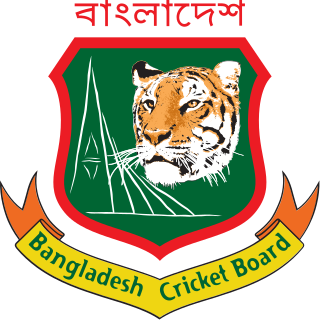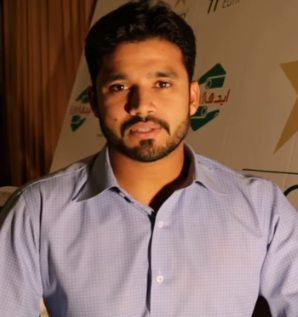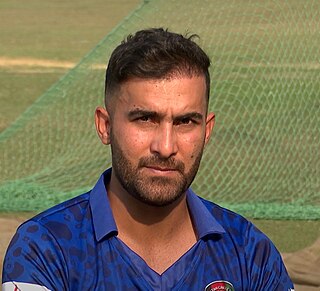
The Bangladesh men's national cricket team, popularly known as The Tigers, is administered by the Bangladesh Cricket Board (BCB). It is a Full Member of the International Cricket Council (ICC) with Test, One-Day International (ODI) and Twenty20 International (T20I) status.
Khaled Mashud, popularly known as Khaled Mashud Pilot is a former Bangladeshi cricketer and a captain in Tests and ODIs. A wicketkeeper and middle order batsman, he was a regular member of the national team between 1995 and 2007. Bangladeshi coach Dav Whatmore claimed Mashud as the "best wicketkeeper in Asia." He contributed to Bangladesh's first ever ODI hat-trick by taking two catches off Shahadat Hossain's bowling. After the international retirement in 2008, he continued to play domestic cricket in Bangladesh as captain of the Rajshahi Division team. Mashud announced his retirement from domestic cricket after captaining his team to win the title in 2011.

The Kenya men's national cricket team represents the Republic of Kenya in international cricket. Kenya is an associate member of the International Cricket Council (ICC) which has Twenty20 International (T20I) status after the ICC granted T20I status to all its members.

The United Arab Emirates men's national cricket team is the team that represents the United Arab Emirates in international cricket. They are governed by the Emirates Cricket Board (ECB) which became an Affiliate Member of the International Cricket Council (ICC) in 1989 and an Associate Member the following year. Since 2005, the ICC's headquarters have been located in Dubai.
Mohammad Aminul Islam is a former Bangladeshi cricketer and captain.

Mohammad Akram Hussain Khan is a former Bangladeshi cricketer. A hard hitting middle order batsman, Akram played first-class cricket for Chittagong Division. As captain, he led Bangladesh to being the winners of the 1997 ICC Trophy. He was the chief selector of the BCB, along with Habibul Bashar and Minhajul Abedin.

Enamul Haque Moni, also known as Enamul Haq Moni, is a Bangladeshi former cricketer who played in 10 Tests and 29 One Day Internationals (ODIs) from 1990 to 2003. After retiring from competitive cricket, he became an umpire, and made his first appearance in an ODI between Bangladesh and Zimbabwe on 3 December 2006. He is the first Bangladeshi Test cricketer to umpire in international cricket.
Gazi Ashraf Hossain, also known as Lipu, born in Dhaka Bikrampur is a former Bangladeshi cricketer who captained the Bangladesh national cricket team in its first seven One Day International (ODI) matches, two in the 1986 Asia Cup, three in the 1988 Asia Cup, and a further two in the 1990 Austral-Asia Cup.
Golam Faruq is a former Bangladeshi cricketer who played in five One Day Internationals from 1986 to 1990. A right arm medium pacer and more than a useful lower-order batsman, Faruq was a regular with the national side throughout the 1980s.

Minhajul Abedin Nannu is a former Bangladeshi cricketer who played in 27 One Day Internationals from 1986 to 1999. He captained Bangladesh twice during the Asia Cup of 1990–91. In local cricket arena he is more commonly known by his nickname, "Nannu".

ASM Raqibul Hasan is a Bangladeshi former cricketer who played in two ODIs in 1986. He is widely regarded as one of the best Bangladeshi batsman of his era. After retiring from international cricket, he has become a match referee. He won the Independence Award in 2023 for his contribution to the field of sports.

Faruque Ahmed born in Dhaka is a former cricketer and current president of Bangladesh Cricket Board. He represented Bangladesh national cricket team from 1988 to 1999.
Cricket is the most popular dry season sport in Bangladesh. It is played nationwide through the months of November to May. Governance of the sport is the responsibility of the Bangladesh Cricket Board (BCB), which was established in 1972.
Syed Ashraful Haque is a former Bangladeshi cricketer. He was the architect of Bangladesh's first ever ICC Trophy victory, over Fiji in May 1979. His 7/23 from 9.1 overs completely destroyed the Fiji middle order, leading Bangladesh to a 22 run win. He was also a member of the Bangladesh side that played in the historic match at Dhaka against the MCC in January 1977. A right hand batsman and an off break bowler, Ashraf remained an integral part of the national side until his retirement in 1981–82 season.

Azhar Ali,(Punjabi:اظہر علی); born 19 February 1985) is a Pakistani former international cricketer. He is former captain of ODI and test side of Pakistan national team.

Soumya Sarkar is a Bangladeshi cricketer. He is a left-handed batter and a right arm medium-fast bowler who mainly plays as an opening batter. He is the only batter to hit 2 sixes in the first over in a T20 World Cup match and the second highest individual run-scorer for Bangladesh in an ODI innings. Sarkar plays for the Rangpur Riders in the Bangladesh Premier League, Khulna Division in the National Cricket League, and Prime Bank Cricket Club in the Dhaka Premier Division.

Gyanendra Malla is a Nepalese cricket coach and former captain of the Nepal national cricket team, currently serving as head coach of Nepal A team. He was a right-handed batsman and an occasional wicket-keeper. He made his debut against Namibia in March 2006. He was one of the cricketers who played in Nepal's first One Day International (ODI) match, against the Netherlands, in August 2018.

Mohammad Rizwan is a Pakistani international cricketer who is the current vice-captain of the Pakistan cricket team in T20I cricket and captains Pakistan Super League (PSL) franchise Multan Sultans. He is a wicket-keeper batsman.

Hashmatullah Shahidi is an Afghan cricketer and currently the captain of Afghanistan national cricket team in One Day International (ODI) and Test cricket. He made his ODI debut for Afghanistan against Kenya in October 2013. Shahidi was one of the eleven cricketers to play in Afghanistan's first ever Test match, against India, in June 2018. He became the first Afghan player to score a test double hundred when he scored 200 not out against Zimbabwe on 11 March 2021.













